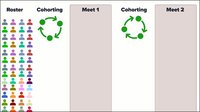Introduction
In 2024, education choice—policies that allow families to choose the school their child attends, outside of the one for which they are zoned—remained a pronounced topic of discussion among legislators in many states.
State Legislative Efforts
State legislatures showed a commitment to expanding school choice in 2024, with 561 bills introduced in 44 states and territories. These bills focused on expanding private educational choice, public-school open enrollment and optimizing school finance models to support choice. According to NCSL’s Prek-12 Education Legislation Database, 21 private choice bills were enacted, highlighting the ongoing momentum behind the private school choice movement.
Legislative Actions
Alabama, Florida, Georgia, Louisiana, Oklahoma, Tennessee and Utah were among the states that enacted education choice laws. These measures expanded and refined existing private choice measures, aimed to broaden access to private and charter schools and encouraged alternative educational models like microschools.
- Alabama HB 129: Establishes a refundable income tax credit to offset the cost of qualifying educational expenses and directs the Department of Revenue to establish education savings accounts through which parents can access funds to direct the education of participating students through education service providers and participating schools.
- Florida HB 1285: Allows private, charter and microschools to operate in unconventional spaces, such as libraries, community centers and theaters, bypassing local land-use and zoning restrictions.
- Florida HB 1403: Revises and expands school choice programs by amending eligibility requirements for choice programs, streamlining administrative processes and improving oversight for scholarship-funding organizations. This legislation also increases contribution credits for nonprofits, expands the use of funds for prekindergarten programs and revises criteria for scholarship account closure.
- Georgia SB 233: Establishes Georgia's Promise Scholarship Accounts, allocating $6,500 per year for eligible students to use on qualified educational expenses and creates the Georgia Education Savings Authority to oversee the program, while also enabling pre-kindergarten program expansion and addressing grants for low-performing schools.
- Louisiana SB 313: Establishes the Giving All True Opportunity to Rise scholarship program, creating the state's first education savings account program. This program is open to all K-12 students regardless of income and begins accepting applications in spring 2025, with funds disbursed in August 2025.
- Oklahoma HB 3386: Requires school districts to approve intra-district transfer of students and directs selection of intra-district transfer students if capacity is exceeded.
- Tennessee SB 2820: Provides that an opportunity public charter school, as defined by statute, may be formed to provide high-quality educational options for students and shall not charge registration fees, enrollment fees, or tuition.
- Utah SB 13: Grants home-based microschools and micro-education entities similar rights and responsibilities as traditional private and charter schools.
Ballot Measures
While legislatures in some states advanced school choice policies, the question was put to voters in other states.
- Colorado Amendment 80: Colorado voters rejected a measure seeking to establish a right to school choice.
- Kentucky Amendment 2: Kentucky voters rejected a measure that would have allowed public funds to be spent on nonpublic schools.
- Nebraska Referendum 435: Nebraska voted to repeal a law providing state-funded scholarships to private schools.
Legislative Action in 2025
States are preparing for another year of debate over education choice. Several states have introduced legislation aimed at expanding educational options:
- Missouri HB 77: Establishes tax credits for educational expenses related to attending private schools of choice and homeschooling, including tuition, books, fees, summer and afterschool learning and other allowable expenses.
- New Hampshire HB 115: Eliminates income requirements for eligibility for the state’s education freedom account program.
- Tennessee HB 1: Establishes an education freedom scholarship program that provides scholarships to students annually to attend their school of choice. The bill defines eligibility requirements, allowable uses of funds and assessment and reporting requirements.
- Texas SB 2: Creates an education savings account program, provides for the administration of the program, and establishes eligibility of students and education organization.
- South Carolina SB 50: Creates tax credits for contributions to scholarship funding organizations that support independent and home schools. The bill also provides for related transparency and accountability measures.
Conclusion
In 2024, legislators in many states continued to pursue the expansion of education choice for families who seek options outside of traditional public schools. Based on early action, it is anticipated that education choice—what it looks like and what it means for individual families and their needs—will continue to be a topic of conversation for legislatures in 2025.











